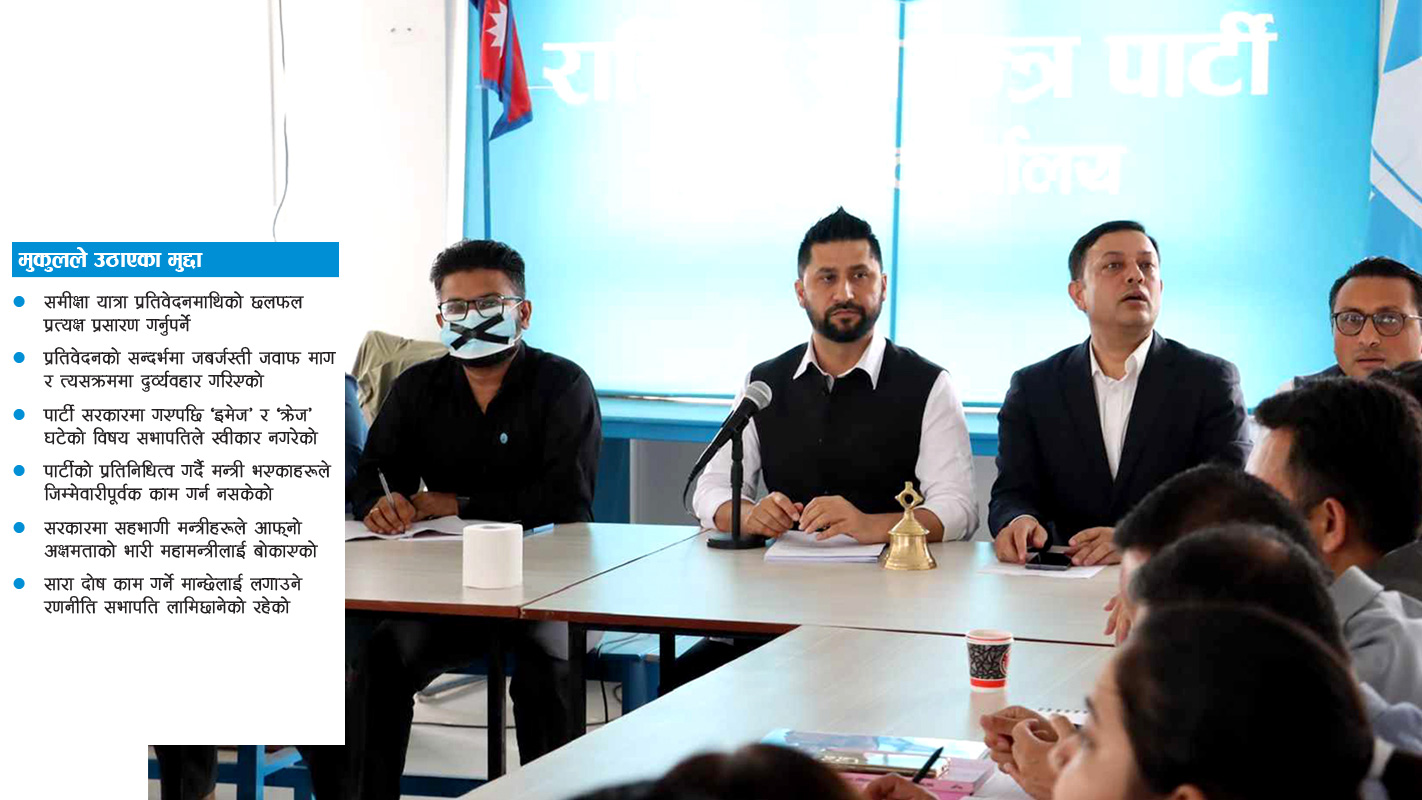Social democracy or socialism?
We use Google Cloud Translation Services. Google requires we provide the following disclaimer relating to use of this service:
This service may contain translations powered by Google. Google disclaims all warranties related to the translations, expressed or implied, including any warranties of accuracy, reliability, and any implied warranties of merchantability, fitness for a particular purpose, and noninfringement.


Socialism seems to be a common principle for the political parties of Nepal who have been criticizing the principles, ideologies and policies that consider power to be the ultimate truth. Parties like Congress, UML, Maoist, Samajwadi, RSVP and others are chanting the gayatri mantra of socialism.



The democratic socialism of the Congress and the multi-party democratic socialism of the people of the UML became the guiding principle. Even the Maoists, who came into the mainstream after armed struggle, have mentioned that Marxist socialism is the future course of action. Madhav Nepal, Upendra Yadav, Mahanth Thakur, Baburam Bhattarai, as the name of the party was socialist, it was natural that socialism was the main mantra. The new and alternative RSVP has also declared constitutional socialism as its main principle. Therefore, in the context of Nepal, socialism seems to be meaningfully hypnotized.
In today's 'post-ideology' and 'post-truth' period, the relevance and justification of political theory, ideology, and argument is itself a matter of debate. The current question is how relevant is the discussion of socialism. It is not wrong for parties to be 'principled'. However, did they trade socialism for the cultivation of votes or did they become socialists because of the socialist-oriented writings in the constitution itself? That the only model of economy is socialism? It seems that liberals and democrats are becoming defensive because the communists are creating political commentary and agenda in Nepal. But, what is needed today is the perennial debate on orthodox socialism or a new debate on social democracy?
social democracy
Congress General Minister Gagan Thapa introduced social democracy into the socialist political discourse. On the eve of the Congress convention held in 2078, there has been a debate about it after he published a document proposing social democracy as a guiding principle. Expressing the idea that the future national goal is a prosperous Nepal, he mentioned that the theoretical basis for achieving this goal is social democracy. No party and leader in Nepal has a clear vision and idea for social democracy like him.
Since its inception, democratic socialism has been the guiding principle of the Congress, while Gagan's proposal of social democracy has created a new wave. Since social democracy and advanced Nepal are something more original than the traditional literature, commentaries, policies and ideology of the Congress, it was not unusual to have debates and discussions about it.
From parliament to government, from Singha Darbar to Baluwatar, from election to alliance, from faction to sub-faction, the 'departure' of theoretical-ideological debate was necessary. Any theory and idea are refined and updated according to the national-international time and environment. In the changing political, economic, social and cultural environment, it is necessary to redefine and modify the principles and policies of the Congress. Therefore, there was a need for such a theoretical-ideological debate in the Congress and Gagan has intervened meaningfully at the appropriate time.
Gagan's proposal may seem contradictory to Congressmen trained and initiated by BP's ideas and democratic socialism. But Gagan's proposal seems complementary to BP's ideas and democratic socialism. BP was dynamic and not status quo and formulaic. Gagan's proposal is BP's ideological legacy. Social democracy is the modified form of BP's principle of building a just and equitable society. Both of them have the highest priority in their ideas, principles or documents - citizens, freedom, democracy, liberalism, progress and just society.
The theoretical introduction of social democracy
The philosophical ground of social democracy is liberalism, i.e. liberal democracy and liberal economy. Social democracy is more liberal, advanced, pluralistic, inclusive and citizen-oriented system than all the democratic systems prevailing in the world so far. Social democracy embraces the basic values and principles of liberalism not only from the political and economic point of view, but also from the social, cultural, linguistic and gender point of view. Social democracy is a liberal in terms of political orientation, moderate in terms of path, liberal in economic terms, pluralistic and inclusive in terms of social and cultural aspects.
Constitutional liberalism, pluralism, citizen supremacy, balance and separation of powers, rule of law, government accountable to citizens, freedom of speech and press are the guiding principles of social democracy. In social democracy, the rights of citizens are created by the state as natural rights and constitutionally guaranteed as inalienable rights. Social democracy has truly embraced the principle of citizen supremacy. So in a social democracy, citizens are truly sovereign and empowered.
Social democracy derived from the ideas of liberal theory pioneers such as Thomas Hobbes, John Locke, and John Stuart Mill was theorized by political scientists such as August Babel, Edward Bernstein, and Wilhelm Limbknecht. The political scientist and leader of the Social Democratic Party of Germany, Thomas Meyer, has analyzed the philosophical-theoretical dimension in the book "Theory of Social Democracy" published in 2007. Mayor's conclusion is that social democracy is the best among the systems defined by political science and practiced in the world so far.
In 2020, an article titled 'Can Social Democrats Save the World Once Again?', by Sherry Berman, professor of political science at Columbia University, was published in the Foreign Policy Journal. His conclusion, who has been studying and researching about social democracy for a long time, is- 'Social democracy is the only option now to save the democratic system and citizens from the destructive political polarization and vicious circle like populist, nationalist, right-wing, left-wing.'
The popularity of the Social Democratic Party
After the success of the Social Democratic Party of Germany in the early nineteenth century, social democracy seems to have gained worldwide popularity. Now all the major, popular and big democratic parties of the world have followed social democracy. Social Democrats of Germany, Labor of Britain, Social Democrats of Sweden, Social Democrats of Austria, Danish Social Democrats of Denmark, Labor of Australia, Finnish Social Democrats of Finland are all social democratic parties. Likewise, the Democratic Party of America, the New Democratic Party of Canada, the Belgian Socialist Party of Belgium and the Renaissance of French President Emmanuel Macron are also social democratic parties.
Initially, most of these parties were democratic socialists. After the Second World War, the same Democratic Socialist Party was transformed and developed as a Social Democrat. Because they followed political and economic policies according to the theoretical concept of social democracy, they succeeded in building an advanced democracy and a developed country. It is inevitable that the parties of Nepal, especially the Congress, should learn from this reality.
Willy Brandt, who was Chancellor of Germany from 1969 to 1974, was also the leader of the Social Democratic Party. He had a close relationship with BP. But he was not a democratic socialist, but a social democrat as claimed by Congress leaders and activists. While praising the political, economic, social and cultural system followed by the Scandinavian countries such as Sweden, Denmark, Norway, and Finland, the congressmen are praising those countries as democratic socialist. But they are not democratic socialist, they are social democratic countries. Therefore, there is wide ambivalence, ambiguity and confusion about social democracy and democratic socialism in Nepal and Congress.
Economics: Liberal or Socialist?
The liberal economic policies followed by the Congress government after 2046 contributed positively to the economy. But according to the feelings and wishes of the people, relatively economic and social goals could not be achieved. Therefore, there has been widespread displeasure, dissatisfaction and anger among the people.
When discussing the economy in the context of Nepal, the exaggerated comment that socialism is a 'virtue' and capitalism i.e. liberalism is a 'sin' has been established. The speech of the communist leaders, which began by denouncing and condemning bourgeois democracy and crony capitalism, ends by demonizing the speech. 'Croker capitalism' has become a permanent slogan of the Communists to denounce and condemn democracy. But rather than crony capitalism, political cronyism is the main problem in Nepal. The death of capitalism has been announced many times, 'obituaries' have also been written, but capitalism has not ended yet. The communists' populist jargon of ``The capitalist revolution is over, now for the socialist revolution'' has been internationalized, imagining the romanticism of abstract socialism.
The role of the state in the name of liberalism or capitalism and the state-controlled economy in the name of unregulated unregulated marketism and communist socialism both failed. Even democratic socialism could not establish an egalitarian society with relatively economic development. However, this is a failure of neoliberalism and 'crony capitalism' rather than liberalism. Even a liberal economy is not without its problems and challenges. But it is less distressed and less conflicted than other economies. Dynamic economy, productivity growth, entrepreneurial society, investment friendly environment, employment, private wealth are positive aspects of liberal economy. The problems of liberal economy can be improved and changed based on liberal policies, inclusive economic growth, progressive taxation and employment oriented policies. Therefore, it would be appropriate to adopt a policy that effectively regulates its undesirable aspects while benefiting from the positive opportunities of a liberal economy.
Nepal's biggest challenge is economic inequality, inclusive economic growth and employment. A liberal economic policy based on sustainable and human development with social justice, inclusive economic growth and equitable distribution should be the future policy. Such an economic policy will ensure a productive and employment-oriented economy while developing an independent economy. Therefore, a mixed economy based on liberal values and a balanced role of the state and the private sector is the next option.
Despite the economic growth and dynamic economy, there is a global debate that capitalism has failed to create an equitable society by reducing economic inequality. Not only in the context of Nepal, there is a need for comprehensive structural reform and transformation in the world economy as well.
Columbia University professor Joseph Stingleys and Harvard University professor Dani Rodrik have also accepted this reality and advocated extensive structural reform and transformation in the economy. In a research article titled "A New Growth Strategy for Developing Nations" published last January, Stingleys and Rodrik advocated comprehensive structural reform and transformation in the world economy and expressed the view that inclusive economic growth and reducing economic inequality is inevitable.
India-China economy message
Nepal can learn from India and China in terms of economy, economics and economic development. After Mao's death in 1976, Deng Xiaoping came to power in China. Despite being a rigid communist regime established under the dictatorship of the proletariat, he followed a liberal and open economic policy, accepting the role of the private sector since 1978. Due to Deng's economic policy, China made a remarkable leap in terms of economic development. China is now the second largest economy in the world and is projected to become the first in the near future. The cause of China's economic development and growth is liberal and open economic policy. They call it socialism with Chinese characteristics. But it is not socialism with Chinese characteristics as they claim, it is actually state-controlled liberalism or capitalism.
Despite being a democratic country, India was following a state-controlled economy in the name of socialist economy until the 1980s. In the name of socialism there was license rule in India. Despite being a visionary leader like Jawaharlal Nehru, India could not develop relatively due to not following appropriate economic policies.
Accepting this reality, since 1991, India has followed a liberal economic policy. As a result of the liberal economic policy, India was able to achieve great achievements in terms of economic development in a short period of time. India is currently the fifth largest economy in the world and is projected to become the third largest economy in the near future. Liberal economy is also the basis of India's economic development and growth. That is why liberal economy and economics are today's reality.
Conclusion
Although written in the constitution, the Nepali state has not been able to fully assimilate the liberal, pluralist, inclusive values from the political, economic, social, cultural point of view. This reality needs to be honestly accepted by all the parties including Congress, UML, Maoist, RSVP, Samajwadi etc. Liberal ideologies and parties are dynamic and changeable, but communists, socialists, conservatives and nationalists are inertial and status quo. By being dynamic and changeable, liberals have managed to maintain their relevance and legitimacy. They have been solving the problems and challenges inherent in liberalism on the basis of democratic values.
The socialism-communism that communists have been trading dreams of has never been implemented anywhere and is unlikely to be implemented now. The value of socialism was high in the political speculation of the twentieth century. But there has been a steep decline in the twenty-first century. In fact, there is no need to implement socialism-communism because it is a completely failed theory, as evidenced by the collapse of the Soviet Union.
Analyzing this larger theoretical-ideological debate from the canvas, it is concluded that the way forward is not socialism, but social democracy. Therefore, it is today's national need for states and parties to adopt the basic values of social democracy and set a concrete roadmap for the development of Nepal.
 प्रकाशित : असार १७, २०८१ ०७:३०
प्रकाशित : असार १७, २०८१ ०७:३०

 २२.१२°C काठमाडौं
२२.१२°C काठमाडौं


















